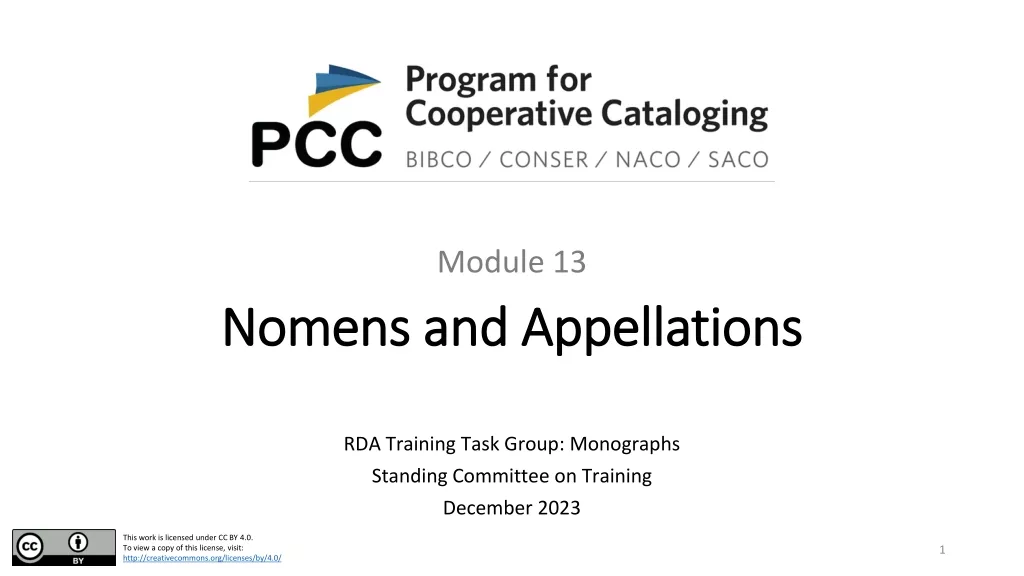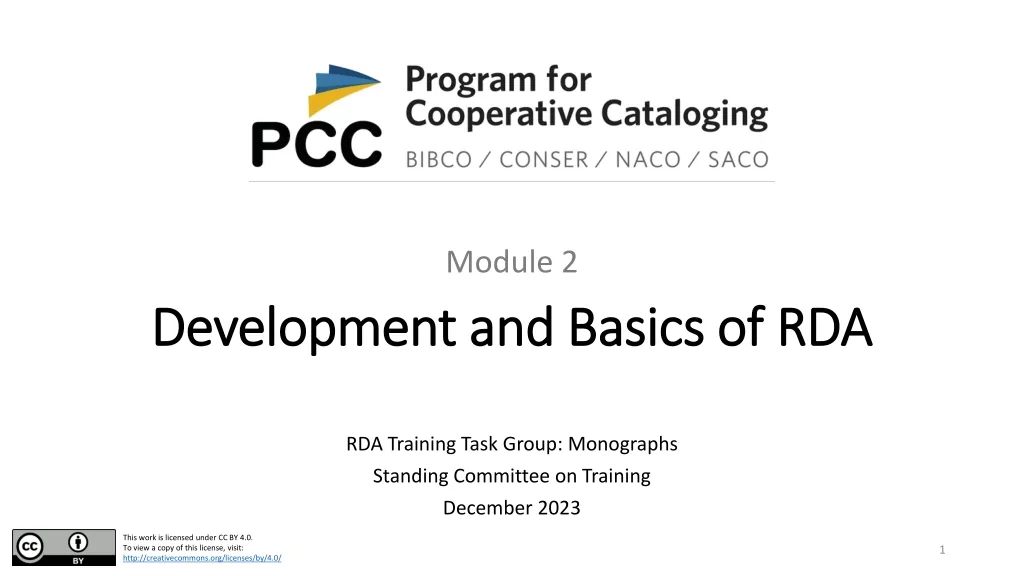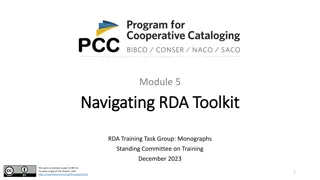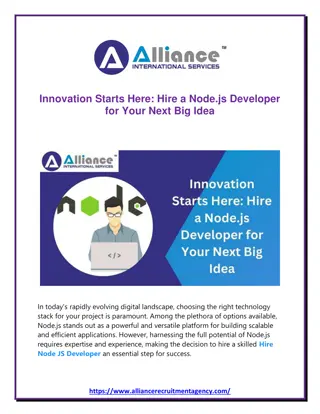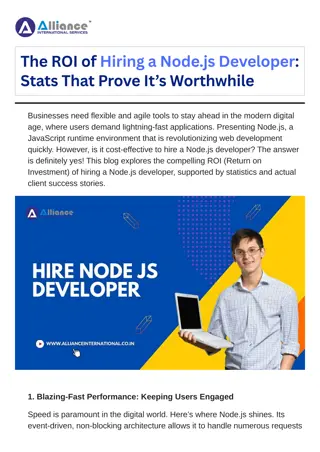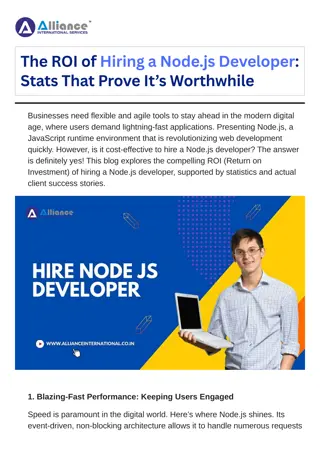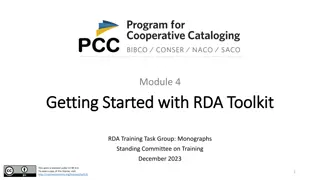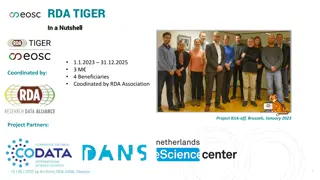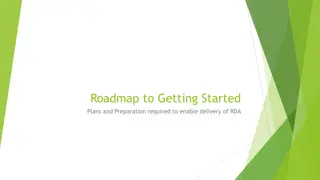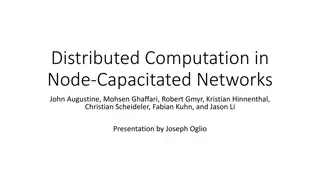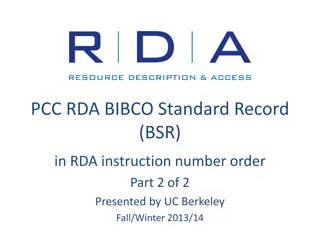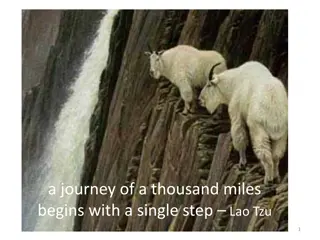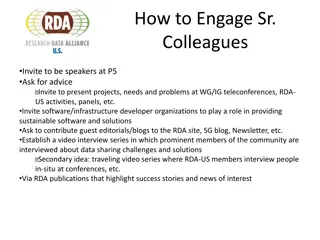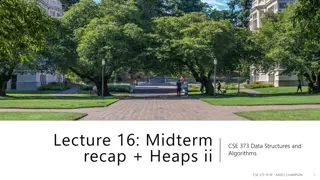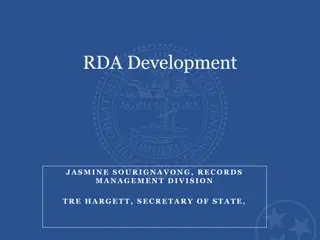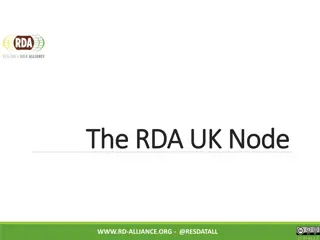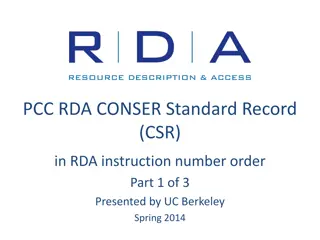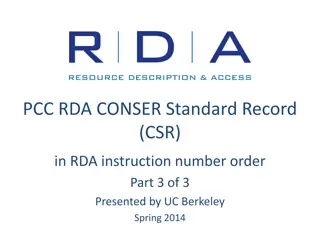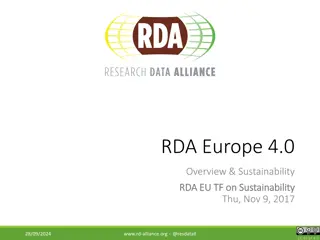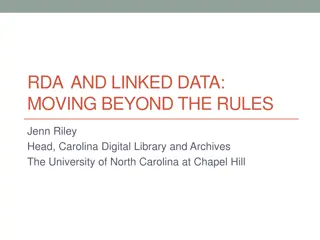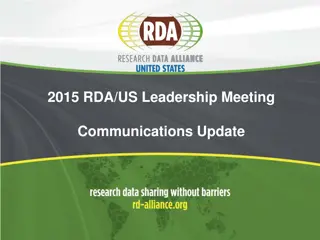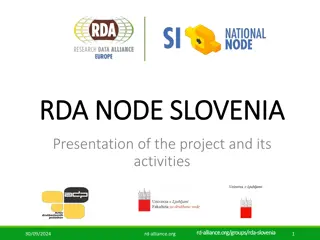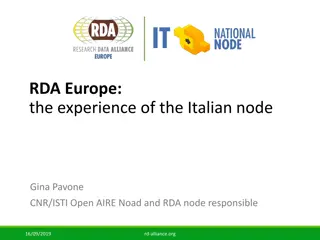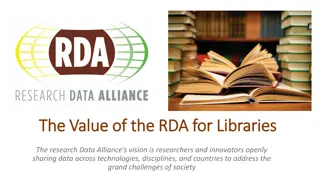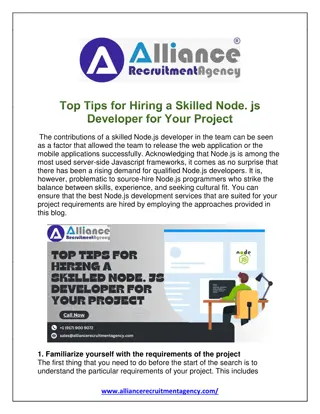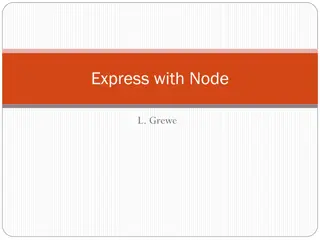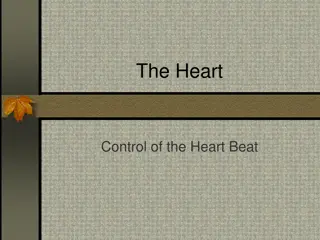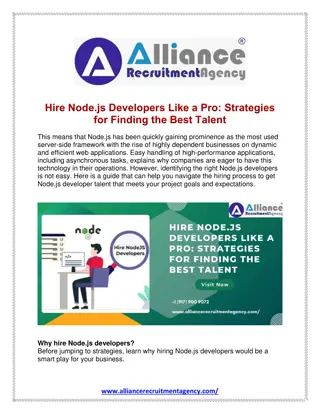Nomen Entity in RDA Training Module
Explore the development of the Nomen entity in RDA training, differentiating nomen and nomen strings, identifying RDA elements for describing a nomen, and examining relationship elements linking RDA entities with nomens. Delve into the origins and attributes of nomens as defined in FRBR and FRAD sta
1 views • 48 slides
Evolution of Cataloging Standards: From Cutter's Objects of the Catalog to RDA Development
The evolution of cataloging standards reflects a rich history dating back to the 19th century, from Cutter's Objects of the Catalog to the development of official RDA. Key milestones include the 3R Project, LRM, RDA Registry, and the shift in cataloging rules driven by changing user needs and digita
6 views • 38 slides
RDA Toolkit User Guide: Navigating Module Features
Explore the comprehensive RDA Toolkit user guide to understand the basic organization, entity and element pages structure, and various features available for navigating the RDA Toolkit effectively. Learn to access and utilize Policy Statements and Metadata Guidance Documentation effortlessly.
5 views • 120 slides
Innovation Starts Here Hire a Node.js Developer for Your Next Big Idea
Discover the key benefits of hiring a Node.js developer for your project. From real-time applications to scalable solutions, unlock the power of Node.js expertise to elevate your development process and drive success.
5 views • 6 slides
The ROI of Hiring a Node.js Developer - Stats That Prove It’s Worthwhile
Explore the ROI of hiring a Node.js developer. Learn how Node.js boosts efficiency, scalability, and performance, driving better user experiences and higher conversion rates. Discover why it's a smart investment. For more information, visit: \/hire-node-js-developer. #hirenodejsdeveloper
1 views • 5 slides
The ROI of Hiring a Node.js Developer - Stats That Prove It’s Worthwhile
Explore the ROI of hiring a Node.js developer. Learn how Node.js boosts efficiency, scalability, and performance, driving better user experiences and higher conversion rates. Discover why it's a smart investment. For more information, visit: \/hire-node-js-developer. #hirenodejsdeveloper
0 views • 5 slides
Accessing and Logging In to the RDA Toolkit
Explore the RDA Toolkit, an integrated online product for cataloging-related resources. Learn how to access and log in through IP authentication or institution login to create a user profile effectively.
3 views • 18 slides
Overview of Policy Service Node (PSN) Architecture
The Policy Service Node (PSN) architecture consists of various key components such as Policy Administration Node (PAN), Monitoring Node (MnT), Inline Posture Node (IPN), and Multi-Function Node. These components work together to enable efficient policy management and network monitoring within a netw
1 views • 5 slides
RDA TIGER - Internationalization Support for Research Data Alliance Working Groups
RDA TIGER, through its services, facilitates the internationalization of EOSC developments by supporting Research Data Alliance Working Groups. It provides assistance in initiating and running WG, engaging international partners, communicating activities, offering small grants, and helping create im
0 views • 7 slides
Role of Lymphadenectomy in Genital Malignancies
Pelvic and paraaortic lymph node evaluation is crucial in the surgical staging of gynecological malignancies. The goals of lymph node dissection are to determine disease extent and guide further treatment. Pelvic lymph nodes include common iliac, external and internal iliac, obturator, sacral, and p
0 views • 16 slides
Roadmap to Enable RDA Delivery: Plans and Preparation
Decision-making framework, journey consultation, phased return preparation, ongoing review, communication strategies for volunteers and participants, and key steps required by RDA National Office to ensure safety and compliance before riders can return on site are detailed in this comprehensive road
0 views • 9 slides
Distributed Computation in Node-Capacitated Networks
Exploration of communication primitives and algorithms in node-capacitated networks, including Node-Capacitated Clique Model, communication on butterfly networks, orientation using Boruvka's algorithm, computing O(a)-orientation, and solving graph problems like BFS trees, maximal independent set, ma
0 views • 7 slides
BSR, RDA, and UC Berkeley Policy Statements
Learn how to apply the BSR (PCC Core) and UC Berkeley Policy Statements to describe print textual monographs, find RDA instructions and Policy Statements, distinguish differences between AACR2 rules and RDA instructions, and exercise judgment in reviewing RDA copy for the local catalog. Acronyms suc
2 views • 48 slides
Cataloging Training Course Overview: FRBR, RDA, BSR
Delve into a comprehensive cataloging training course covering key topics such as FRBR concepts, RDA cataloging instructions, and BSR standards. Each day focuses on specific learning objectives to enhance your understanding of bibliographic records creation. Embrace the journey of mastering FRBR and
0 views • 84 slides
Strategies for Engaging Senior Colleagues and Research Community in RDA Initiatives
Explore a range of strategies to involve senior colleagues in RDA activities, including inviting them as speakers, seeking their advice, and featuring them in guest editorials. Engage the research community through talks, presentations, and student involvement. Utilize enabling factors like stock ma
0 views • 4 slides
Implementing Heaps: Node Operations and Runtime Analysis
Understanding the implementation of heaps involves knowing various node operations like finding the minimum node, last node, next open space, children, and parent. The runtime analysis of heap operations such as peekMin, removeMin, and insert are crucial for optimizing performance. This recap covers
0 views • 9 slides
Efficient Records Management Practices and Procedures
Learn about Records Disposition Authorizations, Statewide RDA, Specific RDA, Retention Schedules, and the Benefits of a Retention Schedule in ensuring compliance with laws, protecting records, and reducing costs. Discover the steps to create, revise, or delete an RDA via the web app provided.
0 views • 35 slides
Overview of RDA UK Node Engagement and Activities
The RDA UK Node, funded through the RDA Europe 4 project, aims to maximize the value of UK contributions to the Research Data Alliance (RDA). It comprises various UK organizations and individuals engaged in RDA activities, liaising with EOSC projects and contributing to RDA Council and Foundation. T
0 views • 9 slides
CONSER Standard Record (CSR) in RDA Instructions
Explore the principles behind CONSER Standard Record (CSR) in RDA instructions through UC Berkeley's training materials. Learn how to apply CSR and UC Berkeley policy statements to describe textual serials and integrating resources in various formats. Discover the differences between AACR2 rules and
0 views • 77 slides
Cataloging Rules and Processes for Textual Resources in RDA
Learning objectives and training provided by UC Berkeley in Spring 2014 on applying the CONSER Standard Record and RDA instructions to describe textual serials and integrating resources in various formats. The acronym review covers core elements and differences between AACR2 rules/AACR2 version of C
0 views • 44 slides
RDA Europe 4.0 Sustainability and Development Overview
RDA Europe 4.0 is a global forum promoting research data interoperability, providing a neutral space for collaboration among 6000+ international experts. It emphasizes problem-solving with bottom-up approaches, aiming to synchronize stakeholders on national, European, and global levels. The sustaina
0 views • 9 slides
RDA and Linked Data: Exploring Beyond the Rules
Explore the intersection of RDA and Linked Data through insightful discussions on leveraging URIs, RDF graph models, and the potential for machine interoperation of library data. Delve into the concept of encoding data in a graph format and the vast possibilities it opens up in the information commu
0 views • 16 slides
RDA/US Communication Update and Goals
This update covers the recent communication activities and goals of RDA/US, a project funded by the National Science Foundation. It includes information on media networking, communication goals, strategic alignment, specific objectives, and engagement initiatives aimed at increasing awareness and en
0 views • 14 slides
RDA Node Slovenia Project Overview
The RDA Node Slovenia project serves as a central contact point between the Research Data Alliance and stakeholders in Slovenia. The project aims to coordinate infrastructure development based on international standards, promote data sharing culture, and engage stakeholders in scientific domains. Ac
0 views • 11 slides
Italian Node's Experience in Open Science Webinar Series
Explore the journey of the Italian node led by Gina Pavone at CNR/ISTI within the RDA Europe framework. The webinar series focused on collaboration with OpenAIRE NOADs and the Italian RDA node, providing insights into Open Science-related topics, RDA themes, and fostering community engagement. With
0 views • 11 slides
Enhancing Libraries' Role Through RDA Engagement
Explore how libraries can benefit from engaging with the Research Data Alliance (RDA), including opportunities to interact with data professionals, researchers, and academics, enhance expertise, and contribute to global data interoperability solutions. Discover the value of RDA for libraries and inf
2 views • 10 slides
Top Tips for Hiring a Skilled Node. js Developer for Your Project
The contributions of a skilled Node.js developer in the team can be seen as a factor that allowed the team to release the web application or the mobile applications successfully. Acknowledging that Node.js is among the most used server-side Javascrip
0 views • 7 slides
The Benefits of Using Express with Node.js
Learn how Express enhances Node.js by providing a structured project layout, simplified routing, and easier development workflow, making it a versatile choice for web and mobile applications. Discover how to set up a new Node.js and Express project and organize your code efficiently.
0 views • 72 slides
The Control of Heart Beat
The heart controls its own beat through the cardiac cycle initiated by the Sinoatrial node (SA node). This myogenic system allows the heart to contract and relax without the need for external impulses. The cardiac muscle responds to electrical waves, leading to synchronized contractions of the atria
0 views • 9 slides
Overview of RDA: Resource Description and Access
An in-depth look at RDA (Resource Description and Access), covering its origins, development by the Joint Steering Committee, transition from AACR3, and key concepts such as representation principles and data sharing beyond libraries. The test period of RDA Toolkit revealed its impact with over 10,0
0 views • 27 slides
Hire Node.js Developers Like a Pro Strategies for Finding the Best Talent
This means that Node.js has been quickly gaining prominence as the most used server-side framework with the rise of highly dependent businesses on dynamic and efficient web applications. Easy handling of high-performance applications, including asynchronous tasks, explains why companies are eager to
0 views • 6 slides
RDA Linked Data Vocabularies & Data Management Workflow
This presentation by Gordon Dunsire explores the RDA linked data vocabularies, data management, and usage workflow. It delves into topics like reference data flow, deprecation policy, semantic versioning, OMR data import, vocabulary display, concept display, and more. The content showcases the tools
0 views • 10 slides
Single Node Architecture in Advanced Computer Networks
In this content, Mahdi Sadeghizadeh discusses the intricacies of single node architecture in advanced computer networks. The topics covered include sensor node architecture, energy consumption, runtime environments, main components of a WSN node, controller options, communication subsystems, and tra
0 views • 39 slides
RDA Data Capture and Storage Overview
RDA data elements, guidelines, and instructions for creating well-formed library and cultural heritage metadata are explored. Techniques for recording relationships between entities and applying new RDA entities are discussed.
0 views • 26 slides
Project Time Planning: Precedence Diagramming Technique (AON)
Learn about Project Time Planning using the Precedence Diagramming Technique with Activity on Node (AON). Understand the Activity on Node Notation, Activity Box, and Activity on Node Network. Explore how to create a project network and interpret the network format. An example project is provided to
0 views • 25 slides
RDA and Linked Data: Encoding Standards, RDF, Beethoven, and Linked Data Best Practices
In this content, you will explore the relationship between RDA (Resource Description and Access) and Linked Data. It covers the concept of encoding RDA data, an introduction to RDF (Resource Description Framework), and showcases how Beethoven's compositions are linked using URIs. Additionally, the b
0 views • 40 slides
RDA Update
The Research Data Alliance (RDA) provides a platform for global data sharing and collaboration. This overview showcases its diverse community, organizational members, and core business services. Discover the vital role RDA plays in advancing research, innovation, and economic growth through open dat
0 views • 21 slides
Node.js Overview and Architecture
Node.js is a powerful framework that provides non-blocking architecture using event loop processing. It is built on Google's V8 JavaScript Engine and is known for its asynchronous execution model. Learn about Node.js background, event loop processing, features, and more in this comprehensive guide.
0 views • 19 slides
Node.js Event Handling
Explore Node.js event handling with examples of creating event handlers, defining callback functions, and starting events like phone ringing. Learn how to effectively manage events in Node.js programming.
0 views • 4 slides
Node.js on Android
Node.js is a powerful JavaScript runtime built on the V8 engine. This article discusses the history of Node.js, its architecture, event-loop model, and non-blocking I/O. It also delves into running Node.js applications on Android using the Anode framework, covering build instructions and prerequisit
0 views • 19 slides
